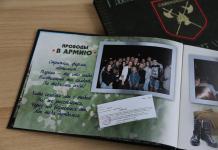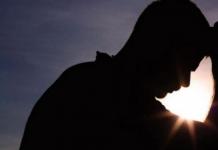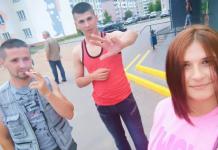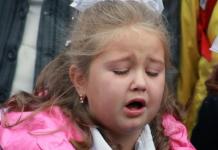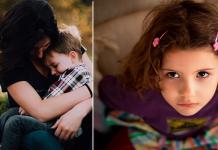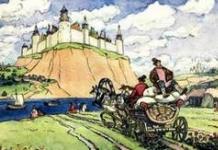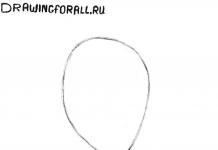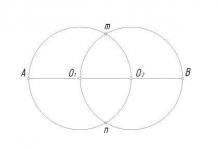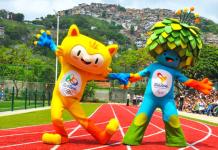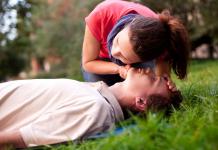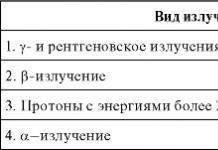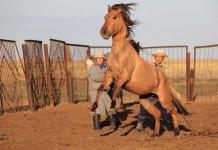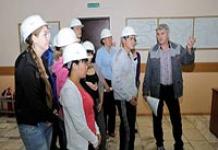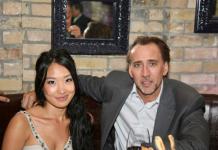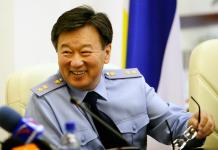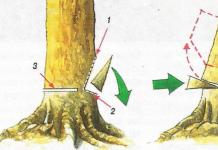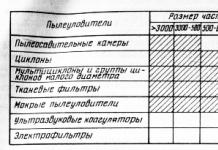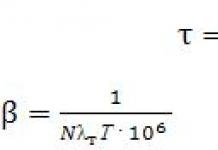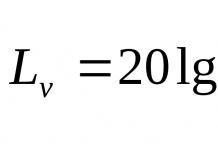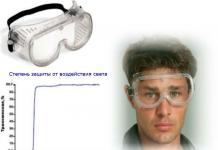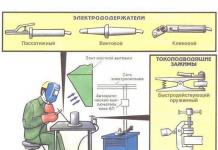Page 1 of 3
Part one. The tale begins to tell ...
Over the mountains, over the forests,
Over wide seas
Against the sky - on the ground
An old man lived in one village.
The old lady has three sons:
The elder was smart,
The middle one was so and so,
The youngest was a fool at all.
The brothers sowed wheat
Yes, they were taken to the city-capital:
Know, that capital was
Not far from the village.
Wheat was sold there,
We accepted money by account
And with a full bag
We returned home.
In a long time al soon
Grief came to them:
Someone began to walk in the field
And stir the wheat.
Little peasants of such sadness
Have not seen the offspring;
They began to think and guess -
As if a thief to spy;
Finally they realized
To stand guard
Keep bread at night
Trap the evil thief.
This is how it only began to get dark,
The elder brother began to gather:
He took out the pitchfork and the ax
And he went on patrol.
The rainy night has come
Fear attacked him,
And out of fears our man
He buried himself under the sennik.

The night is passing, the day is coming;
The sentinel descends from the sennik
And, having poured water on himself,
Began knocking under the hut:
"Hey you sleepy grouses!
Open the doors to your brother
I'm soaked in the rain
From head to toe. "
The brothers opened the doors
The guard was let in
They began to ask him:
Didn't he see what?
The guard prayed
Right, left bowed
And clearing his throat, he said:
"I haven't slept all night;
To my own misfortune,
There was a terrible storm:
The rain was pouring down like that
I wet my shirt all over.
How boring it was! ..
However, everything is all right. "
His father praised him:
"You, Danilo, well done!
You are, so to speak, approximately
Served me faithfully,
That is, being with everything,
Do not hit the face in the dirt. "
It began to get dark again;
The middle brother went to pack:
Took both a pitchfork and an ax
And he went on patrol.
The cold night has come
A shiver attacked the little one,
The teeth began to dance;
He started to run -
And he went on patrol all night
At a neighbor's under the fence.
It was terrible for the fellow!
But here is the morning. He to the porch:
"Hey you, sleepyheads! What are you sleeping!
Open the door for your brother;
There was a terrible frost at night, -
I was chilled to my tummies. "

The brothers opened the doors
The guard was let in
They began to ask him:
Didn't he see what?
The guard prayed
Right, left bowed
And through clenched teeth he answered:
"I haven't slept all night,
Yes, to my unhappy fate,
The cold was terrible at night,
He got me into my hearts;
I rode all night;
It was too inconvenient ...
However, everything is all right. "
And his father said to him:
"You, Gavrilo, well done!"
It began to get dark for the third time,
The youngest must get ready;
He does not lead with a mustache,
Singing on the stove in the corner
From all the stupid urine:
"You are beautiful eyes!"
Brothers, well, blame him,
They began to drive in the field,
He's not moving. Finally
Father came up to him,
Says to him: "Listen,
Run on patrol, Vanyusha.
I will buy you luboks,
I'll give you peas and beans. "
Then Ivan gets off the stove,
Malachai puts on his,
He puts bread in his bosom,
The guard goes to keep.
Ivan goes around the field,
Look around you
And sits down under a bush;
Counts the stars in the sky
Yes, he eats the edge.

Suddenly, about midnight, the horse whinnied ...
Our guard stood up,
Looked under the mitten
And I saw a mare.
That mare was
Everything, like winter snow, is white,
Mane to the ground, golden,
Curled rings in crayons.
"Ehe-he! So that's what
Our thief! .. But wait,
I don't know how to joke
I'll sit on the neck at once.
See what locusts are! "
And, ucha minute,
Runs up to the mare,
The wavy tail is enough
And jumped to her ridge -
Only backwards.
Young mare,
Eyes sparkling madly,
Snake head twisted
And launched like an arrow.
Curls around the fields
Hangs over the moats
Runs galloping through the mountains,
Walks on end through the woods
Wants by force al deceit,
Just to deal with Ivan.
But Ivan himself is not simple -
Holds tightly to the tail.
Finally she was tired.
"Well, Ivan, - she said to him, -
If you knew how to sit
So you own me.
Give me a place to rest
Yes take care of me
How much you know. Yes look:
Three morning dawns
Unleash me
Take a walk in a clean field.
At the end of three days
I'll give you two horses -
Yes, such as they are today
Not even a trace;
Yes, I’ll also make a face of a skate
Only three inches tall,
On the back with two humps
Yes with arshin ears.
Sell two horses, if you like,
But don't give up the skate
Not for the belt, not for the hat,
Not for the black, hey, grandmother.
On the ground and underground
He will be your friend:
He will warm you in winter
In summer it will wrap around cold
In hunger he will treat you with bread,
Give honey to drink in thirst.
I'll go out into the field again
To try strength in the wild. "
"Okay," Ivan thinks.
And into the shepherd's booth
She drives the mare
The matting door closes
And, as soon as dawn broke,
Goes to the village
Singing a song out loud:
"Well done went to Presnya."
Here he comes up on the porch,
Here is enough for the ring,
That there is strength knocking at the door,
As soon as the roof does not collapse,
And shouts to the whole bazaar,
Like a fire broke out.
Brothers galloped off the benches,
They cried out stammering:
"Who knocks hard like that?" -
"It's me, Ivan the Fool!"

The brothers opened the doors
They let the fool into the hut
And let's scold him, -
How dare he frighten them so!
And Ivan is ours, without removing
Neither bast shoes, nor malakhaya,
Goes to the oven
And he speaks from there
About a night adventure,
Surprisingly to all ears:
"I haven't slept all night,
I counted the stars in the sky;
The month, exactly, also shone, -
I did not notice the order.
Suddenly the devil comes himself,
With a beard and mustache;
Erysipelas like a cat's
And the eyes, what are those bowls!
So the devil began to jump
And knock down the grain with your tail.
I don't know how to joke -
And jump on his neck.
Already he dragged, dragged,
I almost broke my head,
But I myself am not a mistake,
Hey, I held him like in a pulp.
Fought, fought my cunning
And finally he prayed:
"Do not destroy me from the light!
A whole year to you for this
I promise to live in peace
Do not stir up the Orthodox. "
I, hey, didn’t measure words,
Yes, I believed the imp. "
Then the narrator fell silent,
He yawned and dozed off.
Brothers, no matter how angry,
They couldn't - they burst out laughing
Grabbing under the sides,
Above the story of a fool.
The old man himself could not restrain himself,
So as not to laugh to tears,
At least to laugh - so it is
It is a sin for old people.
Much time is not enough
From that night it ran, -
I mean nothing
I have not heard from anyone.
Well, what does it matter to us,
Whether a year or two has flown by, -
After all, you can't run after them ...
Let's continue the tale.
Well, that's what it is! Once Danilo
(On a holiday, I remember it was),
Stretched out madly drunk,
Dragged into the booth.
What does he see? - Beautiful
Two horses of the golden mane
Yes to a toy-skate
Only three inches tall,
On the back with two humps
Yes with arshin ears.
"Hmm! Now I know
Why did the fool sleep here! "-
Danilo says to himself ...
The miracle knocked the hops out at once;
Here Danilo runs into the house
And Gavrila says:
"Look how beautiful
Two horses of the golden mane
Our fool got himself:
You have never heard of it. "
And Danilo da Gavrilo,
That there was urine in their feet,
On the nettles straight
So they blow barefoot.
Stumbling three times
Having repaired both eyes
Rubbing here and there
Brothers enter to two horses.
The horses whinnied and snored,
The eyes were burning like a yacht;
Curled rings in crayons,
The tail was streaming golden,
And diamond hooves
Upholstered with large pearls.
It's expensive to watch!
Only the king would sit on them!
The brothers looked at them like that,
That they were a little distorted.
"Where did he get them? -
The elder told the middle one. -
But the speech has been going on for a long time,
That only fools are given treasure,
You should at least break your forehead,
You can't knock out two rubles.
Well, Gavrilo, in that week
Let's take them to the capital;
We will sell the boyars there,
We will divide the money evenly.
And with money, you yourself know
And you will have a drink and take a walk
Just slap the bag.
And to the good fool
There won't be enough guesses
Where his horses are visiting;
Let him seek them here and there.
Well, buddy, hand over! "
The brothers agreed at once,
Hugged, crossed themselves
And returned home
Talking between you
About horses and about a feast
And about a wonderful little animal.
Time rolls along
Hour after hour, day after day.
And on the first week
The brothers are going to the capital city,
To sell your goods there
And at the pier find out
Didn't they come with ships
Germans to the city behind the canvases
And will Tsar Saltan
Basurmans Christians.
Here they prayed to the icons,
Father was blessed
They took two horses secretly
And they went quietly.
Evening made its way to night;
Ivan got ready for the night;
Along the street he walks
He eats the edge and sings.
Here he reaches the field,
Supports hands on hips
And with a jump start, like a pan,
Sideways enters the booth.
Everything was still standing
But the horses were gone;
Just a hunchback toy
His legs were spinning
Clapping his ears with joy
Yes, he danced with his feet.
How Ivan will scream here,
Leaning on the booth:
"Oh you, horses of the Boer-Siwa,
Good horses, golden-maned!
I did not caress you, friends,
What the hell stole you?
To be lost to him, the dog!
To die in the gully!
So that he in the next world
Fall through the bridge!
Oh you, horses of the bora-siva,
Good horses, golden-maned! "
Then the skate whinnied at him.
"Do not grieve, Ivan, - said, -
The trouble is great, I do not argue
But I can help burn.
You are not riveted to the devil:
The brothers brought the Koniks together.
Well, what's the use of empty talk,
Be, Ivanushka, in peace.
Sit on me soon
Just know to yourself hold on;
Even though I am small,
Yes, I will change the horse to another:
How will I start and run,
So I will overtake the devil. "

Here the skate lies down before him;
Ivan sits on a skate,
Takes ears in zagreb,
That there are lobster roars.
The little humpbacked horse shook himself
Got up on his paws, startled,
Slammed with his mane, snored
And flew like an arrow;
Only dusty clubs
A whirlwind curled underfoot.
And in two moments, if not in a moment,
Our Ivan overtook the thieves.
Brothers, that is, were scared,
Combed and hesitated.
And Ivan began to shout to them:
"It's a shame, brothers, to steal!
Even though you are smarter than Ivan,
Yes, Ivan is more honest than you:
He didn't steal your horses. "
The elder, writhing, then said:
"Our dear brother Ivasha,
What to shine is our business!
But take you into account
Our unselfish belly.
No matter how much wheat we sow,
We have a little bit of daily bread.
And if there is a poor harvest,
So at least get into the noose!
Here in such great sorrow
Gavrila and I interpreted
All the other night -
How can I help you?
We did this and that
Finally, they decided like this:
To sell your skates
Even for a thousand rubles.
And thank you, say by the way,
I will bring you an update -
Red hat with a vertebra
Yes, boots with heels.
And besides, the old man is sick,
He can no longer work;
But you have to waste your time, -
You yourself are an intelligent person! "-
"Well, if that is the way, then go, -
Ivan says - sell
Goldmane two horses,
Take me too. "
The brothers looked sideways painfully,
Yes, you can’t! agreed.
It began to darken in the sky;
The air began to grow cold;
Here, so that they do not get lost,
It was decided to stop.
Under the canopies of the branches
Tied up all the horses
Brought with a local basket,
Got drunk a little
And go, whatever God gives,
Who in which of them is much.
Danilo suddenly noticed
That a fire lit up in the distance.
He looked at Gavrila,
I winked with my left eye
And gave a little cough
Pointing the fire quietly;
Here I scratched my head,
"Oh, how dark!" He said.
At least a month that way as a joke
He looked to us for a minute,
Everything would be easier. And now,
Really, we are worse than a tester ...
Wait a minute ... it seems to me
That the light smoke curls there ...
You see, evon! .. That's right! ..
That would be to break up a smoke!
A miracle would have been! .. But listen,
Run, brother Vanyusha!
And, I must confess, I have
No flint, no flint. "
Danilo himself thinks:
"May you be crushed there!"
And Gavrilo says:
"Someone to sing knows what is burning!
Kohl the villagers stuck
Remember him, what was his name! "
Nothing for a fool.
He sits on a skate
Kicks on the steep sides with his feet,
Tugging at him with his hands
With all his might ...
The horse soared, and the trail was gone.
"May the power of the cross be with us! -
Gavrilo shouted then,
Shielding himself with the holy cross. -
What a devil is he underneath! "
The light burns brighter
The hunchback runs faster.
Now he is in front of the fire.
The field shines as if during the day;
A wonderful light streams around
But it does not heat, does not smoke.
Ivan was a miracle here.
“What,” he said, “for the shaitan!
There is a light with five hats,
And there is no heat and smoke;
Eco miracle light! "

The horse says to him:
"There really is something to marvel at!
Here lies the feather of the Firebird,
But for your happiness
Don't take it for yourself.
A lot, a lot of restlessness
It will bring it with itself. "
"You speak! How not so!" -
The fool grumbles to himself;
And, raising the feather of the Firebird,
Wrapped him up in rags
I put rags in my hat
And he turned the skate.
Here he comes to his brothers
And answers to their demand:
"How did I jump there,
I saw a burnt stump;
I fought over him, fought,
So I almost got sore;
I fanned it for about an hour -
No, after all, damn it, faded away! "
The brothers did not sleep the whole night,
They laughed at Ivan;
And Ivan sat down under the cart,
He snored until the morning.
Here they harnessed their horses
And they came to the capital,
We stood in the equestrian row,
Opposite the big chambers.
In that capital, there was a custom:
Kohl does not say the mayor -
Buy nothing
Sell nothing.
Now mass is coming;
The governor leaves
In shoes, in a fur hat,
With a hundred city guards.
The herald is riding with him,
Long-mustache, bearded;
"Guests! Unlock the shops,
Buy, sell.
And the overseers sit
Near the benches and watch
So that there is no sodom,
Not just now, not pogrom,
And so that no freak
Didn't deceive the people! "
The guests of the shop are unlocking,
The baptized people call out:
"Hey, honest gentlemen,
Come to us here!
How do we have tare-bars,
All sorts of different products! "
The buyers are coming
They take the goods from the guests;

Guests count money
Yes, the overseers are blinking.
Meanwhile, the Gradsky detachment
Comes to the horse row;
Looks - a crush from the people.
There is no exit or entrance;
So swarming here and swarming,
And they laugh and shout.
The mayor was surprised
That the people were amused
And he gave the order to the detachment,
To clear the road.
"Hey! You devil barefoot!
Get out of my way! get out of my way!"
The barbel screamed
And they hit the whips.
Then the people began to stir,
He took off his caps and parted.
There is a row of horses before the eyes;
Two horses stand in a row
Young, black,
Curly golden manes
Curled rings in crayons,
The tail is streaming golden ...
Our old man, no matter how ardent,
He rubbed the back of his head for a long time.
"Wonderful, - said, - God's light,
There are no miracles in it! "
The whole detachment bowed here,
I wondered at the wise speech.
The mayor meanwhile
I punished everyone,
So that they don't buy horses,
They did not yawn, they did not shout;
That he is going to the yard
Report everything to the king.
And, leaving part of the detachment,
He went to report.
Arrives at the palace.
"Have mercy, king-father! -
The mayor exclaims
And the whole body falls. -
Don't tell me to be executed
Command me to speak! "
The king deigned to say: "Okay,
Speak, but just smoothly. "
"As I can, I'll tell you:
I serve as a mayor;
Faithfully correct
This position ... "-" I know, I know! "-
"Today, having taken a detachment,
I went to the horse row.
I come - darkness to the people!
Well, neither exit nor entrance.
What to do here? .. Ordered
Drive the people, so as not to interfere.
And so it happened, Tsar Hope!
And I went - and what then?
Before me is a row of horses;
Two horses stand in a row
Young, black,
Curly golden manes
Curled rings in crayons,
The tail is streaming golden
And diamond hooves
Upholstered with large pearls. "

The king could not sit there.
"We must have a look at the horses, -
He says - but it's not bad
And make such a miracle.
Hey, take me a carriage! "And so
The cart is at the gate.
The king washed, dressed up
And rolled to the market;
For the king of archers, a detachment.
Here he drove into the horse row.
Everyone here fell to their knees
And they shouted "hurray" to the king.
The king bowed and instantly
Well done from the cart jump ...
He does not take his eyes off his horses,
On the right, on the left it comes to them,
Calls with an affectionate word,
Beats them quietly on the back,
Ruffling their cool neck,
Strokes a golden mane,
And, rather blindly,
He asked, turning
To those around: "Hey guys!
Whose foals are they?
Who is the boss? "Here is Ivan,
Hands on your hips, like a pan,
Because of the brothers
And, pouting, he answers:
"This couple, king, mine,
And the owner is me too. "-
"Well, I'm buying a couple!
Are you selling? "-" No, I'm changing. "
"What good do you take in the exchange?" -
"Two to five caps of silver." -
"That is, it will be ten."
The king immediately ordered to weigh
And, by his grace,
I gave five rubles in addition.
The Tsar was magnanimous!
Lead the horses to the stables
Ten gray-haired grooms,
All in gold stripes,
All with colored sashes
And with morocco whips.
But dear, as for a laugh,
The horses knocked them all off their feet,
All the bridles have been torn
And they ran to Ivan.
The king went back
Says to him: "Well, brother,
A pair is not given to ours;
Nothing to do, have to
Serve you in the palace.
You will walk in gold
Dress up in a red dress,
Like rolling cheese in butter
All my stable
I give you an order
Tsarsko word in that surety.
What, agree? "-" What a thing!
I will live in a palace
I will walk in gold
Dress up in a red dress,
Like rolling cheese in butter
The whole stables factory
The king gives me orders;
That is, I'm from the vegetable garden
I will become a royal voivode.
What a wonderful thing! So be it
I will serve you, king.
Only, mind you, don't fight me
And let me sleep
Otherwise I was like that! "
Then he clicked horses
And went along the capital,
Himself waving a mitten,
And to the song of a fool
Horses are dancing trepak;
And his hobbyhorse is humpbacked -
So it breaks squatting,
To the surprise of all people.
Two brothers meanwhile
We got the money royally,
They were sewn into their cords,
Knocked on the valley
And they went home.
Houses shared together
They both got married at once,
They began to live and get on
Yes to remember Ivan.
But now we'll leave them
Let's amuse you with a fairy tale again
Orthodox Christians,
What our Ivan has done
Being in the service of the king,
At the state stable;
How did he get into the neighbors,
I slept like a feather,
How cunningly caught the Firebird,
How he kidnapped the Tsar Maiden,
How he drove for the ring,
As an ambassador in heaven,
How he is in the sun village
Kitu begged forgiveness;
How, to the number of other undertakings,
He saved thirty ships;
As in the cauldrons, it was not cooked,
How handsome he was;
In a word: our speech is about
How he became king.
But everything happens contrary to the wishes of the brothers. Ershov makes Ivan lucky. Why?
Because Ivan wishes no one harm. His "stupid mind" is that he does not steal, does not deceive, is faithful to his word. He does not plot against his neighbors. Every time, having done a good deed, Ivan carelessly sings: he sings, returning from the patrol, "A fellow went to Presnya"; sings on the way to the booth, where he has horses. And the real fun - the common dance - happened in the capital, when Ivan was taken into the service of the tsar. Cheerful, kind and simple-minded Ivan is pleasant to us because he does not look like those who consider themselves "smart".
Despised and deceived by his brothers, Ivan began to live at the royal court. Ivan himself is surprised at the change in his fate. According to him, he "out of the garden" became the "tsarist voivode". The improbability of such a change in Ivan's fate was ridiculed by the poet himself, but without such a course of action there would be no fairy tale.
Ivan remained the same in the tsarist service: he got himself the right to sleep enough (“Otherwise, I was like that”). Ershov often says that Ivan is sleeping so soundly that they can barely wake him up. Ivan almost ruined himself, falling asleep at the maiden's tent to her singing and playing the harp. The disgruntled hunchback pushed him with a hoof and said:
“Sleep, my dear, to the stars!
Pour out your troubles! "
Ivan would like to remain carefree, but you cannot be carefree in the tsarist service. Ivan must become different. He learns this. In order not to fall asleep, not to miss the Tsar Maiden again, Ivan gathered sharp stones and nails: "In order to inject himself if he takes a nap again." The faithful horse teaches its owner: “Gay! master! sleep full! It's time to fix things! " The horse is the embodiment of a wonderful fairy-tale power that comes to Ivan's aid. This force acts against the courtiers and the king himself. The troubles that Ivan falls into are formidable. The Tsar learned from the denunciation of the sleeping bag that Ivan was hiding the Firebird's feather. The king is angry. He gets Ivan's confession: “Answer me! I'll screw it up! .. ”The royal desire to have the Firebird's feather is one whim and nonsense. The tsar is ridiculous: having received a pen, he amuses himself with it like a child with a toy: "I stroked my beard, laughed and bit the end of the pen." Ordering to catch the Firebird, the tsar threatens, in case of disobedience, to put Ivan on a stake:
“God have mercy, I am angry!
And sometimes from hearts
I will take off my forelock and with my head. "
Ivan is a "slave" for the tsar and should not contradict either his words or desires. Such is the order to bathe in boiling water:
"If you are in the dawn of dawn
You will not obey the command, -
I will give you to torment
I will order you to torture
Tear apart piece by piece.
The ingratitude of the tsar, to whom Ivan rendered so many services, denunciations, the hypocrisy of the courtiers, their clever slander - this is what caused misfortune even to such undemanding, gentle people like Ivanushka.
Ershov opposed this very real evil with the fabulous power of the hunchbacked horse.
The fabulous hunchbacked horse, like any good invention, contains a serious thought: the strength of the king and his courtiers can be overwhelmed by the strength of faithful comradeship. Ershov poeticized this feeling. Giving Ivan the horses, the mare said:
"Sell two horses, if you like,
But don't give up the skate
Not for the belt, not for the hat,
Not for the black, hey, grandmother.
On the ground and underground
He will be your comrade ... "
Ershov himself revealed the inner meaning of a fabulous invention: partnership is capable of working miracles. And in life, since his student years, Ershov believed in the power of true friendship. At the university, he met Konstantin Timkovsky. They became friends. Both dreamed of useful activities for the good of Russia: it seemed to them that they could transform life in Siberia, make the land of hard labor and exile flourishing, and the peoples who inhabited it, enlightened. The friends vowed to be loyal to this desire and even exchanged rings. On the inside of the rings, the first letters of the Latin words Mors et Vita were engraved, which meant: "Death and Life". The friends vowed to remain faithful to the common civic duty all their lives until their death. With all his activities after graduating from the university, Ershov - a teacher of Russian literature at the Tobolsk gymnasium, and then an inspector, its director, and after a while managing the directorate of schools throughout the vast Tobolsk province, confirmed his loyalty to his oath. The life of friends developed in different ways, but each path began with an oath of loyalty to Russia, sealed by a sense of camaraderie. This feeling was sung by Ershov in the fairy tale.
The hunchback shares all the joys and sorrows of Ivan. When the time came for the most severe test - to jump into the boiling cauldron, the hunchback said that now all his friendship would be needed:
“And rather I myself will perish,
Than I will leave you, Ivan. "
This gave Ivan the determination:
Ivan looked at the skate
And he immediately dived into the cauldron ...
A real fairy tale is always close to the truth. The poet has preserved many signs of folk life. Gathering on patrol, the brothers take with them a pitchfork, an ax - those tools that the peasant could turn into weapons. Ivan drove the caught mare into the shepherd's booth - a temporary corral under a canopy. Getting ready for the road, Ivan takes three onions with him, puts bread in his bosom, and put his poor baggage in a sack. The fabulous capital is very similar to a Russian provincial or even a county town. The governor with a detachment of barbel clears the road in the crowd, scattering blows to the left and right: “Hey! you devil barefoot! Get out of my way! Get out of my way!" The people take off their hats. Trade guests-merchants in collusion with overseers, deceive and cheat buyers. The bargaining is not only money trade, but also the exchange of kind. The heralds shout. The king is accompanied by archers. Such descriptions very much color the tale and lend credibility to the fiction.
The fairy tale is also colored with references to the time, albeit brief, but expressive - it is said about the morning light, the daylight of the sky, the evening twilight and the darkness of the night: “It has just begun to shade”, “A clear noon is coming”, “This is how it just started to get dark”, “ It began to darken in the sky "," The West was quietly burning down "," The cold night has come "," The night has come, the month is rising. " A vivid picture sketched in verse.
BIOGRAPHIC REFERENCE
Ershov Peter Pavlovich - famous writer (1815 - 1869), a native of Siberia; educated at St. Petersburg University; was the director of the Tobolsk gymnasium. He published poems in the "Library for Reading" by Senkovsky and in the "Contemporary" by Pletnev. The fairy tale "The Little Humpbacked Horse", written by him as a student and for the first time in an excerpt in 3 volumes of "Libraries for Reading" 1834 with a commendable review of Senkovsky, brought fame to Ershov; the first four verses of the tale were sketched by Pushkin, who read it in manuscript. "Now this kind of writing can be left to me," Pushkin said at the time. The great poet liked the lightness of the verse, with which - he said - Ershov "treats like his serf man." Then it was published as a separate book, and during the life of Ershov went through 7 editions; starting with the 4th edition, in 1856 it came out with the restoration of those places that were replaced by dots in the first editions. "The Little Humpbacked Horse" is a folk work, almost word for word, according to the author himself, taken from the mouths of storytellers from whom he heard it; Ershov only brought him into a more slender form and supplemented in places.
A simple, sonorous and strong verse, purely folk humor, an abundance of successful and artistic pictures (a horse market, a zemstvo court for fish, a mayor) brought this tale widespread; she caused several imitations (for example, the Little Humpbacked Horse with golden bristles).
The first edition of The Little Humpbacked Horse did not appear in its entirety, part of the work was cut out by the censorship, but after the second edition was released, the work was released without censorship.
After the release of the fourth edition, Ershov wrote: "My horse again galloped throughout the Russian kingdom, good luck to him." The Little Humpbacked Horse was published not only at home, but also abroad.
Analysis of the literary tale "The Little Humpbacked Horse" by Pavel Petrovich Ershov.
1) The history of the creation of the work:
Since the time of Pushkin, Russian literature has acquired a folk character. Pushkin's initiative was immediately taken up. The fairy tale "The Little Humpbacked Horse" became one of the responses to the call of the great poet to turn Russian literature towards nationality.
Throughout her life, Ershova did not abandon the idea of describing Siberia. He dreamed of creating a novel about his homeland, similar to the novels of Fenimore Cooper.
Thoughts about the people became the reason for the birth of the fairy tale "The Little Humpbacked Horse". The closeness to the people, knowledge of their life, habits, customs, tastes, views ensured the fairy tale unprecedented success, which it enjoyed even in the manuscript.
For the first time the tale was published in the "Library for Reading" in 1834, later it was published in separate editions. The tsarist censorship made its own adjustments - the tale came out with cuts. Pushkin introduced Ershov into poetry circles. There is evidence that he himself edited the tale and wrote an introduction to it.
Ershov's fairy tale took place next to Pushkin's fairy tales. So it was considered by contemporaries. Official criticism reacted to it with the same disdain as to Pushkin's fairy tales: it is an easy fable for idle people, but not devoid of amusement.
2) Rodgenre Features:
The genre of a fairy tale is peculiar. Let's consider two points of view: V.P. Anikin examines the work of P.P. Ershova as realistic and believes that the fairy tale "The Little Humpbacked Horse" is the poet's response to the process of forming a realistic fairy tale in literature. An unconventional view of the genre in studies of P.P. Ershov professor V.N. Evseeva: "The Little Humpbacked Horse" is a work of a poet - a romantic, "a parody - folk tale", in which "the author's romantic irony sets the tone"; the aspiring poet expressed the idea of "freedom as the great value of romantic consciousness." In the fairy tale, you can also find features of a romantic poem (poetic form, three-part structure, epigraphs to parts, lyric-epic character of the narrative, plot tension, uncommon events and main characters, expressiveness of style.
In "The Little Humpbacked Horse" there are also signs of the novel: the significant length of the life story of Ivanushka Petrovich, the evolution of his character, the change in the functions of the characters, the development of portraits, landscapes, descriptiveness, dialogues, the interweaving of "fairy rituals" with an abundance of realistic scenes and details, as if snatched from life, breadth of social background.
In the first half of the 19th century, among folk tales, plots similar to "The Little Humpbacked Horse" were not found. Only after the fairy tale was published, folklorists began to find plots that arose under the influence of this fairy tale.
However, in a number of folk tales there are motives, images and plot moves that are present in "The Little Humpbacked Horse": tales about the Heat - Bird, the magic horse Sivka - Burka, about the mysterious raid on the Garden of Eden, about how the old fool - the king was delivered a young bride, etc.
Ershov skillfully combined the plots of these fairy tales, creating a magnificent, vivid work with exciting events, wonderful adventures of the protagonist, his resourcefulness and love of life.
3) Topics, problems, idea. Features of their expression.
The meaning of the tale is in irony, in a joke, in outright satire: those who want to get rich do not get wealth. And Ivan the Fool achieved everything, because he lived honestly, was generous and always remained true to his duty and word.
4) Plot and composition:
The very beginning of The Little Humpbacked Horse testifies to Ershov's deep interest in genuine folk life. Instead of the idyllic "villagers" that existed in literature, Ershov shows people living with labor interests. The fabulous plot unfolds against the mundane, prosaic background of a real peasant life. Ershov shows the mundane prosaic underside of the repeatedly idealized "rural life".
A fairy tale as a literary work has a classical three-part form, a logical sequence in the development of events, individual parts are organically intertwined into a single whole. All actions performed by the heroes are justified by the classical laws of a fairy tale.
Compositionally, the tale of P.P. Ershov consists of three parts, each of which is preceded by an epigraph:
1. The tale begins to tell.
2. Soon the fairy tale takes its toll. And the business is not done soon.
3. Until now, Makar dug vegetable gardens. And now Makar got into the governor.
In these epigraphs, both the tempo and the density of the narrative, and the changing role of the protagonist, determined by the accuracy of the popular proverb, are already guessed.
Each of the parts has its own dominant conflict:
1. Ivan and the Little Humpbacked Horse - and savvy brothers. (The space of the family is the state.)
2. Ivan and the Little Humpbacked Horse - and the tsar with his servants. (The space of a kingdom so strikingly resembling in its breadth the Russian borders.)
3.Ivan and the Little Humpbacked Horse - and the Tsar Maiden. (Space of the Universe.)
The plot of each of the three parts is a complete whole, consisting of fast-paced events. Time in them is compacted to the limit, and space is infinite; in each part there is a central event that most fully reveals the characters of the heroes and predetermines further events.
In the first part, this is the capture of the mare. She gives Ivan foals, together with them Ivan goes to serve in the royal stable. The first part ends with a short story about further events up to the final episode, how the main character became king, thereby preparing the reader for further events, intriguing him.
In the second part, two events are central: Ivan, with the help of the Humpbacked Horse, catches the Firebird and delivers the Tsar Maiden to the palace.
As in many folk tales, Ivan performs the third, most difficult, almost impossible task - he gets the Tsar Maiden's ring and meets the whale; at the same time he visited heaven, where he talked with Month Month, the mother of the Tsar Maiden, freed the whale from torment, for which he helped Ivan get the ring. The third part is thus the most eventful. It uses the motives known in the folk tale: the hero. helps the counter, who, in turn, through the chain of characters, helps the hero himself, helping to complete the most difficult task.
The third part is the most eventful. It also uses the motives known in the folk tale: the hero helps the counterpart, who, in turn, through the chain of characters, helps the hero himself, helping to complete the most difficult task.
All three parts of the tale are tightly linked by the image of Ivan and his faithful friend the Little Humpbacked Horse.
The tale ends with the ending characteristic of folklore: the victory of the protagonist and a feast for the whole world, which was also attended by the narrator.
The plot is mainly driven by the character of the protagonist, who is always at the center of events. His courage, courage, independence, resourcefulness, honesty, ability to value friendship, self-esteem help to overcome "all obstacles and win.
One of the traditional artistic techniques used by the storyteller is doubling, which takes on an all-encompassing character: plot motifs and fragments are doubled, characters have their counterparts and "twins", and many parallel syntactic constructions with lexical repetitions appear in the narrative structure. There is a doubling of the genre - a fairy tale within a fairy tale, the "spheres of the universe" (earthly and underwater, earthly and heavenly kingdoms) are doubling. The doubling function is the creation and destruction of a fabulous reality; "Doubles - brothers" "Danilo da Gavrilo" are satirically described.
SPACE IN A FAIRY TALE:
Everyday and fantastic are intertwined in a fairy tale. The fantastic universe consists of three separate kingdoms - earthly, heavenly and underwater. The main thing is earthly, which has many characteristics and features, the most detailed:
Over the mountains, over the forests, Over the wide fields ...,
The brothers sowed wheat, Yes, they took them to the city-capital: Know, that capital was Not far from the village.
In addition to the "topography", the earthly kingdom has its own weather, signs of tsarist and peasant life. This kingdom is the most densely populated: there are peasants and archers, animals and birds, the tsar and his servants, merchants and the mysterious "tsar Saltan". "I came from the earth Zemlyanskaya, From a Christian country."
The heavenly kingdom is similar to the earthly one, only "the earth is blue", the same tower with Russian Orthodox crosses, a fence with a gate, a garden.
The underwater kingdom is contradictory: it is huge, but smaller than the earthly one; its inhabitants are unusual, but subordinate to one another according to the laws of the earthly kingdom.
All three kingdoms, with their seemingly dissimilarity, are essentially the same, obey the same social laws - the laws of tsarist bureaucratic Russia, and with regard to geography, world order - according to the laws of the perception of the world by a Russian - a steppe, for whom there is and cannot be anything larger and more immense than the land with its fields, forests and mountains.
The reader is surprised by the characters inhabiting the underwater and heavenly kingdoms.
The image of "Miracle-Yuda Fish Kit" is an echo of myths about the origin of the Earth (firmament on three whales):
All its sides are dug, Palisades are hammered into the ribs, On the tail there is cheese - the pine forest is noisy, On the back there is a village ...
Village, peasant peasant Russia. The whale is “forced”, “suffering”, like Ivan, the last on the social ladder, according to the plot of the tale, he is experiencing transformation into an autocratic tyrant.
Ershov, talking about an unusual heavenly family- The Tsar - to the girl, her mother Month Month and "brother" the Sun, is guided by the mythological representations of Siberian peoples, similar to the Chinese mythological tradition, where the Sun is interpreted as "yang" - masculine, and the Moon - "yin" - feminine.
5) The system of character images:
One side, character system consists of traditional images of a folk tale. These are Ivan the Fool, Ivan's brothers, the old Tsar, Tsar Maiden, a wonderful horse - a magical helper, the Firebird.
On the other hand, the fairy-tale world of Ershov is multi-character. It presents a multi-level gradation of the main and secondary characters, supplemented by "doubles" - in the "mirror" reflection of the earthly kingdom underwater (king - whale, Ivan - ruff).
The folk-fabulous type of Ivan the Fool was chosen as a positive hero. The prototype of Ivanushka Petrovich is the "ironic fool". As an ironic fool, he is extremely active in speech: the author depicted in this image the critical, ironic-looking detached attitude of the people's mind and heart to any power, to any human temptations (Ivanushka's only temptation is the Firebird's feather that delighted him).
Already at the first test, Ivan turned out to be the most honest and courageous. If his brother Danilo immediately got cold feet and "buried himself under the sennik", and the second - Gavrilo, instead of guarding the wheat, "walked the whole night with a neighbor under the fence", then Ivan conscientiously and without fear stood on guard and caught the thief. He is sober in his surroundings, he perceives any miracle as a natural phenomenon, and if necessary, he enters into a struggle with it. Ivan correctly evaluates the behavior of others and directly tells them about it, regardless of their faces, whether they are brothers or the tsar himself.
At the same time, he is quick-witted, able to forgive other people's misdeeds. So, he forgave his brothers, who stole his horses, when they convinced him that they did it out of poverty.
In all cases, Ivan shows independence, does not hesitate to express his opinion, does not lose his self-esteem. Seeing the Tsar Maiden, he directly says that she is "not at all beautiful."
If the "brothers" embody for Ershov inertia, greed and other unattractive traits, then Ivan is in his eyes a true personification of the best moral qualities of the people.
A natural, reasonable idea of the need for humane human-to-human relations lies at the heart of the image of Ivan. Hence the originality of his relationship with the king; the "fool" cannot learn the necessity of observing a respectful tone in any way; he speaks to the tsar as with an equal, is insolent to him - and not at all demonstratively, but simply because he sincerely does not understand the "indecency" of his tone.
An unusual image of Ivan's assistant - a skate - a "toy" height of three vershoks, arshin ears, which are convenient to "clap with joy", and two humps.
Why is it a two-humped ridge? Maybe this image came from childhood - Ershov lived in Petropavlovsk and Omsk - cities that are the gates to the noonday lands - India, Persia, Bukhara; there, in the bazaars, he met animals unprecedented for Siberia - two-humped camels and long-eared donkeys. But perhaps this is an oversimplified analogy. The image of Ivanushka Ershov painted from the booth Petrushka - the favorite of the Russian people. Parsley was unprepossessing: a nose, a hunchback. Didn't the humps "move" from Parsley's back to the ridge?
There is also a hypothesis: the horse is a distant "relative" of the ancient mythological winged horse, capable of taking off to the Sun. The wings of the miniature Ershov's skate “fell off”, but the “humps” remained, and with them a mighty force capable of delivering Ivanushka to heaven. Man has always wanted to fly, so the image of a skate is attractive to the reader.
IVAN AND KONEK:
A couple of heroes as one main character are presented in this fairy tale in an original way (in comparison with the folklore fairytale tradition).
These heroes are both contrasted and juxtaposed: the hero and his "horse". Curious, reckless, even arrogant - a hero - and a judicious, wise, compassionate friend of his are essentially two sides of the same "broad Russian nature."
With all this, they are surprisingly similar to each other: Ivan is a fool, the youngest, a "hero with a defect" from the generally accepted point of view; The Little Humpbacked Horse is a "freak" in his world, he is also the third, the youngest, so they turn out to be dialectically complementary and mutually exclusive heroes.
The antihuman principle, hostile to the people, is embodied in the Ershov fairy tale by the tsar, represented by a fierce and stupid tyrant - an image that is no less revealing than Pushkin's tsar Dadon. He is far from a good-natured and sincere king. "I'll screw you up", "I'll put you on a stake", "get out, slave." The very vocabulary, typical of everyday serf use, testifies to the fact that in the person of the tsar Ershov gave a collective image of serf Russia.
I will give you to torment, I will order you to torment, To tear apart pieces into small pieces ...
Continuing Pushkin's traditions, Ershov directs all the arrows of sarcasm to the figure of the tsar - a pitiful, stupid, lazy tyrant, scratching himself out of boredom.
All appearances of the king are accompanied by remarks like: "The king told him, yawning," "The king, shaking his beard, shouted after him."
The attitude towards the Tsar and his courtiers is very well manifested when P.P. Ershov describes the orders and relationships in the sea kingdom, which is a mirror image of the earthly world. They even need a lot of "fish" to execute the decree. P.P. Ershov's Ivan does not respect the Tsar, since the Tsar is capricious, cowardly and extravagant, he resembles a spoiled child, not a wise adult.
The Tsar is depicted as funny and unpleasant, not only Ivan laughs at him, but also Month Monthly, this is how Month responded after learning that the Tsar wants to marry the Tsar Maiden:
You see that the old horseradish has started: He wants to reap where he did not sow! ...
By the end of the tale, the contemptuous attitude towards the tsar is quite clear. His death in the cauldron ("Boom into the cauldron - / And boiled there") completes the image of an insignificant ruler.
COURT:
But the king is only the main oppressor of the people. The trouble is that all his servants are in charge of him. Ershov paints a vivid picture of the gathering of the people. They oppress not only peasants, but also household people. No matter how hard the people work, they still remain poor.
The appearance of the "city detachment" headed by the mayor testifies to the police regime. The people are treated like cattle: the watchman shouts, hits people with a whip. The people, without protesting, are silent.
The governor, the overseers, the horse detachments, "stirring up the people" - these are the pictures of feudal Russia, emerging through the playful verse of Yershov. The fun that broke out in the crowd indescribably surprised the authorities, they are not used to people expressing emotions.
6) Features of the speech organization of the work:
A) the narrator's speech:
But now we will leave them, Again we will amuse Orthodox Christians with a fairy tale, What our Ivan has done ...
“Eh, listen, honest people! Once upon a time there lived a husband and wife ... "
And also a story about some events begins with a particle "well":
Well, so here it is! Once Danilo (On a holiday, I remember, it was) ...
Well, this is how our Ivan goes to the Ocean for the ring ...
And as a folk storyteller interrupts the presentation, explaining something incomprehensible to the listener:
Then, taking him into the casket, he shouted (with impatience) ...
B) syntax and vocabulary:
Each verse is an independent semantic unit, sentences are short, simple.
The language of a fairy tale, according to L.A. Ostrovsky, has 700 verbs, which is 28 percent of the text. The verbs theatricalize the fairytale action, create dynamism, the movements of the heroes are emphatically scenic, comic: "Well done, jump from the cart ...", "skip off the bed ...", "shake your beard", "with a quick wave of your fist". Sometimes there is a whole cascade of verbs.
The characters' speech should be "booth", colloquially colloquial, rudely familiar. The verse form approaches the folk, partly raesh (spoken) verse - with its paired rhyme, with a small number of syllables in this rhythmic unit of folk verse speech. Lexical "discord", "spoiled" syntax are not only appropriate, but necessary as signs of the free element of the theatrical square, playing with the word. The scenic character of The Little Humpbacked Horse explains why many theaters have willingly staged performances based on this work for a century.
C) means of expression (language of a fairy tale):
The tale is permeated with light humor, slyness, characteristic of the Russian people from time immemorial and reflected in its oral art.
Like Pushkin, Ershov does not abuse metaphors, epithets that adorn words. Exceptions are ritual fabulous expressions: "the eyes were burning with a yacht", "the tail was streaming golden," "the horses of the riot," "the horses of the Boer, the Siva." But he knows how to give a big semantic load to a convex, purely folk image. As the hero Ivan is presented in two planes, so his every word, phrase is ambiguous. His descriptions often contain irony and mockery.
Proverbs, sayings, sayings, jokes also create funny things in a fairy tale:
Ta-ra-ra-li, ta-ra-ra! The horses came out of the yard; The peasants caught them and tied them tighter ...
A raven sits on an oak tree, He plays a trumpet ...
The fly sings a song: “What will you give me for a message? Mother-in-law beats her daughter-in-law ... "
Comparisons: that mare was all white as winter snow; I twisted my head like a snake and launched like an arrow; the face is like a cat's, and the eyes are like those bowls; greenery here is like an emerald stone; like a rampart on the ocean, a mountain rises; the hunchback flies like the wind.
Epithets: rainy night, golden mane, diamond hooves, wonderful light, summer rays, sweet speech.
Metonymy: you will walk in gold.
Rhetorical questions, addresses, exclamations: What a miracle?
Obsolete words: sennik (mattress with hay), malachai (sloven), matting (fabric), razhy (strong, healthy), tools (braid, ribbon), shabalka (a means for crushing smth.), forelock (lock of hair, fluff) , busurman (unfaithful, non-Christian), balusters (funny stories).
Phraseologisms: he didn’t hit his face in the dirt, he didn’t lead the light with his mustache, even smash his forehead, it’s like rolling cheese in butter, neither alive nor dead, the devil would take you!
7) Rhythmic-intonation structure:
In general, the tale is written by a sonorous four-legged chorea, it is distinguished by the musicality of the verse. Rhythm disturbance sometimes occurs.
There are verbal exaggerations: "heat - birds", "a mile, ran to a friend," "said the hunter of the sea with laughter," finishing the verse.
There are many verbal rhymes in the text, they are almost always voiced. Rhyming words carry the greatest semantic load. This helps to better remember the content.
The Little Humpbacked Horse Tale and Its Ideological and Artistic Merits
The main advantage of the tale is its pronounced nationality. As if not one person, but the whole people collectively composed it and passed it orally from generation to generation: it is inseparable from folk art. Meanwhile, this is a completely original work of a talented poet, who emerged from the depths of the people, who not only mastered the secrets of his oral and poetic creativity, but also managed to convey its spirit.
Among the countless number of folk tales like the Little Humpbacked Horse were not found, and if from the second half of the 19th century folklorists recorded the same stories, they arose under the influence of the Yershov fairy tale. At the same time, in a number of Russian folk tales there are similar motifs, images and plot moves that are present in The Little Humpbacked Horse: there are tales about the Firebird, the unusual horse Sivka-Burka, about mysterious raids on the garden, they got the decrepit tsar a young wife, etc.
Ershov did not just put together pieces from separate fairy tales, but created a completely new, integral and complete work. It attracts readers with bright events, wonderful adventures of the protagonist, his optimism and resourcefulness. Everything here is bright, lively and entertaining. The tale is remarkable for its amazing severity, logical consistency in the development of events, the cohesion of individual parts into one whole. Everything that the heroes do is fully justified by the laws of a fairy tale.
Read it.
“Well, [...], - she said to him,
If you knew how to sit
So you own me.
Give me a place to rest
Yes take care of me
How much you know. Yes look:
Three morning dawns
Unleash me
Take a walk in a clean field.
At the end of three days
I'll give you two horses -
Yes, such as they are today
Not even a trace;
Yes, I’ll also make a face of a skate
Growing only three vershok,
On the back with two humps
Yes with arshin ears<
…>
- Write the name of the author and the title of the work from which this passage is taken.
- Insert the character name that was missing on the first line.
- Write the name of the character who says these words.
- Explain the meaning of the highlighted words and phrases.
- Imagine horses are speechless. Write the horse's monologue from the work from which the passage is taken, about your master. The volume is about 100 words.
Answers and evaluation criteria
- P.P. Ershov, The Little Humpbacked Horse (1 point).
- Ivan (1 point).
- (Magic) mare (1 point).
- A top is a measure of length approximately 4.5 cm (1 point).
Arshin is a measure of length equal to approximately 71 cm (1 point). In a fairy tale, these words can be used as examples of artistic understatement and exaggeration.
- Horse monologue
Task 2. WORKING WITH TEXT
Option 1. Prose text
Read it. Write an essay about this story, answering the questions posed (not all questions can be answered). Write coherent text
Sasha Cherny (Alexander Mikhailovich Glikberg, 1880-1932)
Wandering Dog
Swaying slowly, I returned from the sea to my forest hut, laden like a mule with a bathing suit, a bathrobe, a net with vegetables and wild pears picked up from the reeds. At the well, I turned around: behind me, someone sighed politely, as if he wanted to say: "Turn around, please."
Out of the reed jungle, a skinny, lanky dog of the same common breed, with a pretzel tail and dumplings on the ears, came out onto the path. I stopped, the dog too. He carefully, with the experienced eye of a tramp, examined my belongings, my jacket, which had burnt out in the sun, my face, and when I began to climb the mountain again, he resolutely followed me, as if I were his grandfather whom he met after many years of separation.
His decision was not difficult to understand: “A foreigner ... Not a farmer - farmers do not bathe ... He does not eat meat, but an empty stomach can be filled with soup and bread. Not evil, rather kind, therefore, will not drive away. From that breed of people who every year come from all directions to Provence to wallow in the sand by the sea and do nothing. Like stray dogs ... "
The dog was not mistaken, I did not chase him away, and at the door of the hut I fulfilled the first duty of hospitality: I gave him cold well water in a sardine tin. The tin was much less than a dog's thirst, but I patiently poured water until the dog, out of politeness, wetting his tongue for the last time, looked at me with grateful eyes:
- Thanks.
He was a little cunning with me, but well - if you don't - you won't have dinner ... such is the fate of all vagabonds.
I was sitting in the hut, he was on the doorstep, outside. He, of course, tried to explain to me as best he could, that he did not want to eat at all, that he followed me only because he liked me. Carefully, as if by chance, he moved his front paw over the threshold. But I really love dogs and I really don't like fleas - our eyes met, and he realized that he could have dinner outside.
I soaked dry bread in sour milk diluted with water (I can't run to a neighboring farm for cream!). The dog ate it. He was very hungry - sunken sides, a little hasty sips ... But he did not chomp, tried to eat slowly, with dignity, as even well-fed boys do not always eat.
Then I warmed up rice soup with tomatoes. The dish is not quite right, but do I have a dog's kitchen?
We honestly divided the soup among ourselves, and for a snack I gave him a piece of butter paper, which he, screwing up his eyes with pleasure, carefully licked it - he licked it so that the piece of paper became completely transparent. He refused the wine. Even offended, as, however, dogs are always offended if a person offers them something absurd. Indeed, if someone offered you some copy ink after dinner, wouldn't you be offended?
An old man Sanguinetti, the owner of my home, a small man who looked like a cunning lizard, crawled out of the vineyard with a pickaxe. He looked at the dog lying on the threshold, smacked his badly shaven lip and said:
- Your dog? Not yours? Nobody has such a thing here - I know ... I don't like either cats or dogs! Cats are thieves, dogs bite. So you fed her, and for that she, hee-hee, will tear your pants ...
What nonsense! What kind of dog will offend the person who fed him and greeted him at his doorstep?
The dog also did not like the dry voice of the old man, like the rustle of faded corn leaves. He pushed my nose to my knees, wagged his tail twice (the dinner was unimportant, especially not worth wagging) and, contemptuously rounding the old slanderer, disappeared behind the hill in the juniper bushes. Well fed, quiet and warm evening - and what will happen tomorrow, only people think about it ...
- What about the storyteller? Justify your conclusions referring to the text.
- How does the narrator feel about nature?
- How is the dog shown in the story? What art techniques?
- Why does the story need the image of "old man Sanguinetti"?
- What artistic details (primarily portrait ones) do you remember? Why?
- How do you understand the meaning of the ending (last sentence) of the story?
Option 2. Poetic text
Read it. Write an essay about this poem by answering the questions (not all questions can be answered). Write coherent text, freely, understandably, demonstratively and competently.
Maya Ivanovna Borisova (1932-1996)
SONG OF THE SPRING SUN
I'll get up early, early, I slowly
I'll wake up the ruddy kid.
I caress the sleepy one -
Nothing special -
I'll be a nanny, honey.
The sky will turn pink above you
Each puddle will become blue.
I will paint
It's OK -
I'll be a painter, honey.
The clouds were smoky during the winter,
It would be necessary to rinse them in the Neva.
I'll work hard for the wash
Nothing to be ashamed of -
I'll be a laundress, honey.
Look outside - it's light there.
Go outside - it's warm there.
Is it early or late -
You yourself understood:
It's me, the spring sun!
- Why is the poem called "Song ..."?
- Is the poem addressed to someone? If so, to whom?
- How does this poem remind of folk songs and how does it differ from them?
- Pay attention to rhymes. What is unusual about them?
- How are the stanzas in a poem arranged?
- Why are repetitions needed?
Evaluation criteria
| Evaluation criteria | Points |
| The presence / absence of direct coherent answers to questions and presence / absence of errors in the understanding of the text. Rating scale: 0 - 5 - 10 - 15 |
15 |
| The general logic of the text and the composition of the work. Rating scale: 0 - 3 - 7 - 10 |
10 |
| Support of evidence with text, appropriateness of citation. Rating scale: 0 - 2 - 3 - 5 |
5 |
| The presence / absence of stylistic, speech and grammatical mistakes. / Year: / City: / |
A commented edition of a fairy tale beloved by many generations. For primary school age.
- About the fairy tale "The Little Humpbacked Horse"
* * *
company liters.
About the fairy tale "The Little Humpbacked Horse"
Father Ivanushka sent to guard the wheat: someone got into the habit of trampling it at night. Ivan obeyed - went on patrol. The nineteen-year-old poet, a student of St. Petersburg University, Pyotr Pavlovich Ershov, told about what followed and many other things in his tale. The author of The Little Humpbacked Horse studied at the Department of Philosophy and Law. But Ershov was attracted to poetry, history, music. Once he confessed: "I am ready to admire all graceful people to the point of dizziness ..."
Ershov was a contemporary of the great Pushkin, Zhukovsky. From them he heard praise. The tale was first published in a magazine, and then - as a separate book. Since 1834, memorable for Ershov, when this happened, the tale of the humpbacked skate was learned and loved by all reading Russia.
The poet was born in Siberia. As a child, he had to travel a lot: his father served in the hectic post of volost commissar - the family often moved from place to place. The Ershovs lived in the fortress of St. Peter (now Petropavlovsk), and in Omsk, and in the Far North - in Berezovo (then a place of exile) and Tobolsk. The future poet learned about the life of peasants, taiga hunters, coachmen, merchants, Cossacks, heard stories about Siberian antiquity, and learned fairy tales from old-timers. Ershov, who became a gymnasium student, was lucky again: he settled in Tobolsk with his mother's relatives, with the merchant Pilenkov - there were different people here in the human. From them, Ershov learned about the Trans-Baikal territories, about the distant caravan routes to the south and east. The time has come, and Ershov himself became a storyteller-storyteller.
Ershov came to St. Petersburg with his parents, with his brother, who also became a student. They settled in a small wooden house on the outskirts of the city. In the evenings, having gone to bed, Ershov liked to tell his family stories. It was here for the first time that friends heard from the poet his tale of the humpbacked horse. The tale was borrowed from Siberian storytellers, but it is not always easy to decide where we have the art of the people, and where is Ershov's own work.
Are they going close, far
Are they driving low, high
And they saw someone -
I know nothing.
Soon the tale is spoken
Business is going on in a sissy way.
How can one fail to recognize the words from folk tales: "Whether it is close, far away, low, high - soon the tale will tell itself, it will not be done soon." Or here's another - the hunchbacked horse three times asks the saddened Ivan:
“What, Ivanushka, is not happy?
What did you hang the little head with? "
And the fact is that the tsar sends Ivan to the ocean; the hunchback always consoles its master:
“This is a service, not a service;
Service is all, brother, ahead! "
In folk tales, the hero also finds solace from his friends and assistants. They also ask him why he was not happy, why he hung his head below his shoulders, and they console him with the same words: "This is not a service - a service, the service will be ahead." From folk tales, Ershov also took the words about Ivan's transformation:
And so he became handsome -
Whatever in a fairy tale to say,
You can't write with a pen!
It is not difficult to recognize the usual fairy-tale ending in the last verses about the wedding feast:
Heart love! I was there,
I drank honey, wine and beer;
Though it ran along the mustache,
Not a drop got into my mouth.
But the poet not only retells folk tales with his poems. Ershov embellished folk fiction, blossomed it with his fiction, supplemented it. Here Ivan watches the wheat at night - he sits under a bush, counting the stars in the sky:
Suddenly, about midnight, the horse whinnied ...
Our guard stood up,
Looked under the mitten
And I saw a mare.
We can follow all of Ivan's movements: here his ears were struck by a sudden whinny, now he got up, now he put his hand to his eyes in order to better examine something there in the distance - and saw a mare. Ershov gives free rein to his imagination:
That mare was
Everything, like winter snow, is white,
Mane to the ground, golden,
Curled into crayons.
There are many wonderful things in folk tales, but you can guarantee that you will not find exactly such a description in them.
"The Little Humpbacked Horse" captures us with fiction. What do we not learn, and wherever we do not stay together with Ivan and his hunchback! In the fabulous capital - at the auction, in the horse row, in the royal stable, by the ocean-sea, in the outlandish lands where firebirds are found, on the seashore, at the very edge of the surf, from where a deserted expanse opens and you can see how the "lonely »White shaft. Here Ivan rode on a hunchback to the meadow:
What a field! greenery here
Like an emerald stone;
The breeze blows over her,
So it sows sparks;
And flowers in the green
Untold beauty.
In the distance, a mountain rises, “all of pure silver” - a dazzling shine spills around. The beauty of the wizarding world opens before our mind's eye.
Ershov without fear combines magic fiction with a joke. Across the ocean, a whale lies motionless - a miracle yudo. Sharp-witted peasants settled on it:
The peasants plow on the lip,
Boys dance between the eyes
And in the oak grove, between the mustache,
The girls are looking for mushrooms.
The poet laughs merrily at the old fantastic tales that the earth is supported by three whales.
Playfulness never leaves Ershov. She constantly accompanies his most enthusiastic descriptions. Even the princess did not seem beautiful to Ivan: when he saw her, he was disappointed - she seemed to him pale, thin:
“And the little leg, the little leg!
Ugh you! like a chicken!
Let someone fall in love
I won’t take it for free. ”
Retelling folk tales, Ershov retained their acute social meaning. The author's sympathies are entirely on the side of the persecuted and despised Ivan. Ivan was already known as a fool in his own family; he really seems to be a fool: he lies on the stove and sings at the top of his lungs: "You are beautiful eyes!" But the question is: what are his older brothers better than him? ... They don’t bawl songs, don’t climb on the stove in bast shoes and malakhai, don’t knock on doors so that “the roof almost collapses,” but they have no other merits. On the contrary, there is a lot of bad in them: none of them is true to their word, they deceive their father, are dishonest. For the sake of profit, they are ready for anything - they would be happy to kill Ivan. On a dark night, they send him into the field for a light, in the hope that he will not come back.
Danilo himself thinks:
"May you be crushed there!"
And Gavrilo says:
“Someone to sing knows what is burning!
Kohl the villagers stuck, -
Remember him, what was his name! "
But everything happens contrary to the wishes of the brothers. Ershov makes Ivan lucky. Why?
Because Ivan wishes no one harm. His "stupid mind" is that he does not steal, does not deceive, is faithful to his word. He does not plot against his neighbors. Every time, having done a good deed, Ivan carelessly sings: he sings, returning from the patrol, "A fellow went to Presnya"; sings on the way to the booth, where he has horses. And the real fun - the common dance - happened in the capital, when Ivan was taken into the service of the tsar. Cheerful, kind and simple-minded Ivan is pleasant to us because he does not look like those who consider themselves "smart".
Despised and deceived by his brothers, Ivan began to live at the royal court. Ivan himself is surprised at the change in his fate. According to him, he "out of the garden" became the "tsarist voivode". The improbability of such a change in Ivan's fate was ridiculed by the poet himself, but without such a course of action there would be no fairy tale.
Ivan remained the same in the tsarist service: he got himself the right to sleep enough (“Otherwise, I was like that”). Ershov often says that Ivan is sleeping so soundly that they can barely wake him up. Ivan almost ruined himself, falling asleep at the maiden's tent to her singing and playing the harp. The disgruntled hunchback pushed him with a hoof and said:
“Sleep, my dear, to the stars!
Pour out your troubles! "
Ivan would like to remain carefree, but you cannot be carefree in the tsarist service. Ivan must become different. He learns this. In order not to fall asleep, not to miss the Tsar Maiden again, Ivan gathered sharp stones and nails: "In order to inject himself if he takes a nap again." The faithful horse teaches its owner: “Gay! master! sleep full! It's time to fix things! " The horse is the embodiment of a wonderful fairy-tale power that comes to Ivan's aid. This force acts against the courtiers and the king himself. The troubles that Ivan falls into are formidable. The Tsar learned from the denunciation of the sleeping bag that Ivan was hiding the Firebird's feather. The king is angry. He gets Ivan's confession: “Answer me! I'll screw it up! .. ”The royal desire to have the Firebird's feather is one whim and nonsense. The tsar is ridiculous: having received a pen, he amuses himself with it like a child with a toy: "I stroked my beard, laughed and bit the end of the pen." Ordering to catch the Firebird, the tsar threatens, in case of disobedience, to put Ivan on a stake:
“God have mercy, I am angry!
And sometimes from hearts
I will take off my forelock and with my head. "
Ivan is a "slave" for the tsar and should not contradict either his words or desires. Such is the order to bathe in boiling water:
"If you are in the dawn of dawn
You will not obey the command, -
I will give you to torment
I will order you to torture
Tear apart piece by piece.
The ingratitude of the tsar, to whom Ivan rendered so many services, denunciations, the hypocrisy of the courtiers, their clever slander - this is what caused misfortune even to such undemanding, gentle people like Ivanushka.
Ershov opposed this very real evil with the fabulous power of the hunchbacked horse.
The fabulous hunchbacked horse, like any good invention, contains a serious thought: the strength of the king and his courtiers can be overwhelmed by the strength of faithful comradeship. Ershov poeticized this feeling. Giving Ivan the horses, the mare said:
"Sell two horses, if you like,
But don't give up the skate
Not for the belt, not for the hat,
Not for the black, hey, grandmother.
On the ground and underground
He will be your comrade ... "
Ershov himself revealed the inner meaning of a fabulous invention: partnership is capable of working miracles. And in life, since his student years, Ershov believed in the power of true friendship. At the university, he met Konstantin Timkovsky. They became friends. Both dreamed of useful activities for the good of Russia: it seemed to them that they could transform life in Siberia, make the land of hard labor and exile flourishing, and the peoples who inhabited it, enlightened. The friends vowed to be loyal to this desire and even exchanged rings. On the inside of the rings, the first letters of the Latin words Mors et Vita were engraved, which meant: "Death and Life". The friends vowed to remain faithful to the common civic duty all their lives until their death. With all his activities after graduating from the university, Ershov - a teacher of Russian literature at the Tobolsk gymnasium, and then an inspector, its director, and after a while managing the directorate of schools throughout the vast Tobolsk province, confirmed his loyalty to his oath. The life of friends developed in different ways, but each path began with an oath of loyalty to Russia, sealed by a sense of camaraderie. This feeling was sung by Ershov in the fairy tale.
The hunchback shares all the joys and sorrows of Ivan. When the time came for the most severe test - to jump into the boiling cauldron, the hunchback said that now all his friendship would be needed:
“And rather I myself will perish,
Than I will leave you, Ivan. "
This gave Ivan the determination:
Ivan looked at the skate
And he immediately dived into the cauldron ...
A real fairy tale is always close to the truth. The poet has preserved many signs of folk life. Gathering on patrol, the brothers take with them a pitchfork, an ax - those tools that the peasant could turn into weapons. Ivan drove the caught mare into the shepherd's booth - a temporary corral under a canopy. Getting ready for the road, Ivan takes three onions with him, puts bread in his bosom, and put his poor baggage in a sack. The fabulous capital is very similar to a Russian provincial or even a county town. The governor with a detachment of barbel clears the road in the crowd, scattering blows to the left and right: “Hey! you devil barefoot! Get out of my way! Get out of my way!" The people take off their hats. Trade guests-merchants in collusion with overseers, deceive and cheat buyers. The bargaining is not only money trade, but also the exchange of kind. The heralds shout. The king is accompanied by archers. Such descriptions very much color the tale and lend credibility to the fiction.
The fairy tale is also colored with references to the time, albeit brief, but expressive - it is said about the morning light, the daylight of the sky, the evening twilight and the darkness of the night: “It has just begun to shade”, “A clear noon is coming”, “This is how it just started to get dark”, “ It began to darken in the sky "," The West was quietly burning down "," The cold night has come "," The night has come, the month is rising. " A vivid picture sketched in verses:
The time was leaning towards evening;
The sun has already descended;
In a quiet flame of grief
Dawn broke.
Ershov learned from the speech of the people a lot of words and expressions, like "dawn", "about midnight" and the like. Everyday speech gave the fairy tale special artistic properties.
Having got to heaven, Ivan reflects:
“Eco miracle! Eco miracle!
Our kingdom is beautiful though ...
And how does it compare with the sky,
So under the insole will not work.
That the earth is something! .. After all, it
And black and dirty;
The land is blue here,
And what a bright one! ..
Look, hunchback,
You see, where, to the east,
Like lightning shines ...
Tea, heavenly light ...
Something is painfully high! "
In this speech there is delight, reflection, surprise, comparison, assumption, and irony. This is a lively folk speech with stops, unexpected turns in the current. It also includes common words: "eco", "tea", "painful", and they cannot be replaced by any others - instead of "Eco miracle!" say "That's a miracle!" or “What a miracle!”, instead of “tea” - “probably”, “probably”, and instead of “painfully high” - “very high”. Replacing the words would mean losing the folk tone in the fairytale speech.
Ershov was a brilliant master of verse. Like any real poet, Ershov's verse was a powerful poetic tool. Here is just one example: on the way back from the heavenly kingdom, Ivan reached the ocean -
Here is the skate running along the whale,
He knocks on the bones with a hoof.
The rhythm itself becomes an image of the thumping of hooves. But now the skating is replaced by a jump, and the rhythm becomes different:
Got a little bit - and instantly
Jump to the far shore.
They say that Pushkin was delighted with the skill of Ershov. The young poet studied with the great master. It is believed that the beginning of the tale is four verses "Over the mountains, beyond the valleys ..." - Pushkin ruled. It is no coincidence that the verses:
“Way-road, gentlemen!
Where are you from and where? " -
inspired by "The Tale of Tsar Saltan", where there are lines:
"Oh you, guests, gentlemen,
How long have you traveled, where? "
And Ershov's verse “Cannons from the Fortress Are Firing” was composed on the model of Pushkin’s: “Cannons Are Firing from the Wharf”.
Ershov's fairy tale is a beautiful and lofty work of art. The poet felt and conveyed the charm of folk tales, and most importantly, he divided folk concepts and ideas.
Like ordinary people, Ershov dreamed of the victory of good and justice. This is what made the tale of the humpbacked skate a popularly recognized work.
The poet died in August 1869. During the life of Ershov, the tale was published seven times and many times after the death of the author. Pushkin dreamed of publishing a fairy tale with pictures. But such a book should have been cheap.
In Ershov's fairy tale, the humpbacked jumps and jumps from one generation of people to the next, and the cheerful thumping of his hooves will sound for many more readers.
V. Anikin
The tale begins to tell.
Over the mountains, over the forests,
Over wide seas
Against the sky - on the ground
An old man lived in one village.
The old lady has three sons.
The elder was smart,
Middle son this way and that,
The youngest was a fool at all.
The brothers sowed wheat
Yes, they were taken to the city-capital:
Know, that capital was
Not far from the village.
Wheat was sold there,
Money was accepted in the account
And with a full bag
We returned home.
In a long time al soon
Grief came to them:
Someone began to walk in the field
And stir the wheat.
Little peasants of such sadness
Have not seen the offspring;
They began to think and guess -
As if a thief to spy;
Finally they realized themselves
To stand guard
Keep bread at night
Trap the evil thief.
This is how it only began to get dark,
The elder brother began to gather:
He took out the pitchfork and the ax
And he went on patrol.
The rainy night has come
Fear attacked him,
And out of fears our man
He buried himself under the sennik.
The night is passing, the day is coming;
The sentinel descends from the sennik
And, having poured water on himself,
Began knocking under the hut:
“Hey you sleepy grouses!
Unlock the doors for your brother
I'm soaked in the rain
From head to toe! "
The brothers opened the doors
The guard was let in
They began to ask him:
Didn't he see what?
The guard prayed
Right, left bowed
And clearing his throat, he said:
“I haven't slept all night,
In my own misfortune,
There was a terrible storm:
The rain was pouring down like that
I wet my shirt all over.
How boring it was! ..
However, everything is all right. "
His father praised him:
“You, Danilo, well done!
You are, so to speak, approximately
Served me faithfully,
That is, being with everything,
I didn’t hit my face in the dirt ”.
It began to get dark again,
The middle brother went to pack:
Took both a pitchfork and an ax
And he went on patrol.
The cold night has come
A shiver attacked the little one,
The teeth began to dance;
He started to run -
And he went on patrol all night
At a neighbor's under the fence.
It was terrible for the fellow!
But here is the morning. He to the porch:
“Hey you sleepyheads! What are you sleeping!
Unlock the door for your brother;
There was a terrible frost at night -
I was chilled to my tummies. "
The brothers opened the doors
The guard was let in
They began to ask him:
Didn't he see what?
The guard prayed
Right, left bowed
And through clenched teeth he answered:
“I haven't slept all night,
Yes, to my unhappy fate,
The cold was terrible at night,
He got me into my hearts;
I rode all night;
It was too inconvenient ...
However, everything is all right. "
And his father said to him:
"You, Gavrilo, well done!"
It began to get dark for the third time,
The youngest must get ready;
He does not lead a mustache,
Singing on the stove in the corner
From all the stupid urine:
"You are beautiful eyes!"
Brothers, well, blame him,
They began to drive in the field,
But, no matter how long they shouted,
He's not moving. Finally
Father came up to him,
Says to him: “Listen,
Run on patrol, Vanyusha;
I will buy you luboks,
I'll give you peas and beans. "
Then Ivan gets off the stove,
Malachai puts on his,
He puts bread in his bosom,
Keep the guard going.
The night has come; the month rises;
Ivan goes around the field,
Look around you
And sits down under a bush;
He counts the stars in the sky
Yes, he eats the edge.
Suddenly, about midnight, the horse whinnied ...
Our guard stood up,
Looked under the mitten
And I saw a mare.
That mare was
Everything, like winter snow, is white,
Mane to the ground, golden,
Curled into crayons.
“Ehe-he! So that's what
Our thief! .. But wait,
I don't know how to joke
I'll sit on the neck at once.
See what locusts are! "
And, ucha minute,
Runs up to the mare,
The wavy tail is enough
And jumped to her ridge -
Only backwards.
Young mare,
Eyes sparkling madly,
Snake head twisted
And launched like an arrow.
Curls around the fields
Hangs over the moats
Runs galloping through the mountains,
Walks on end through the woods
He wants, by force al deceit,
Just to deal with Ivan;
But Ivan himself is not simple -
Holds tightly to the tail.
Finally she was tired.
“Well, Ivan,” she said to him, “
If you knew how to sit
So you own me.
Give me a place to rest
Yes, take care of me
How much you know. Yes look:
Three morning dawns
Unleash me
Take a walk in a clean field.
At the end of three days
I'll give you two horses -
Yes, such as they are today
Not even a trace;
Yes, I’ll also make a face of a skate
Only three inches tall,
On the back with two humps
Yes with arshin ears.
Sell two horses, if you like,
But don't give up the skate
Not for the belt, not for the hat,
Not for the black, hey, grandmother.
On the ground and underground
He will be your friend:
He will warm you in winter
In summer it will wrap around cold
In hunger he will treat you with bread,
Give me honey to drink in thirst.
I'll go out into the field again
To try strength in the wild. "
“Okay,” Ivan thinks.
And into the shepherd's booth
She drives the mare
The matting door closes
And, as soon as dawn broke,
Goes to the village
Singing a song out loud
"Well done went to Presnya."
Here he comes up on the porch,
Here is enough for the ring,
That there is strength knocking at the door,
As soon as the roof does not collapse,
And shouts to the whole bazaar,
Like a fire broke out.
Brothers galloped off the benches,
Stuttering, they cried out:
"Who knocks hard like that?"
"It's me, Ivan the Fool!"
The brothers opened the doors
They let the fool into the hut
And let's scold him -
How dare he frighten them so!
And Ivan is ours, without removing
Neither bast shoes, nor malakhaya,
Goes to the oven
And he speaks from there
About a night adventure,
Surprisingly to all ears:
“I haven't slept all night,
I counted the stars in the sky;
The month, exactly, also shone, -
I did not notice the order.
Suddenly the devil comes himself,
With a beard and mustache;
Erysipelas like a cat's
And the eyes - what are those bowls!
So that devil began to jump
And knock down the grain with your tail.
I don't know how to joke -
And jump on his neck.
Already he dragged, dragged,
I almost broke my head.
But I myself am not a mistake,
Hey, I held him like in a pulp.
Fought, fought my cunning
And finally he prayed:
“Do not destroy me from the light!
A whole year to you for this
I promise to live in peace
Do not stir up the Orthodox. "
I, hey, didn’t measure words,
Yes, I believed the imp. "
Then the narrator fell silent,
He yawned and dozed off.
Brothers, no matter how angry,
They couldn't - they burst out laughing
Grabbing under the sides,
Above the story of a fool.
The old man himself could not restrain himself,
So as not to laugh to tears,
At least to laugh - so it is
It is a sin for old people.
Much time is not enough
From that night it ran, -
I mean nothing
I have not heard from anyone.
Well, what does it matter to us,
Whether a year or two has flown by, -
After all, you can't run after them ...
Let's continue the tale.
Well, that's what it is! Once Danilo
(On a holiday, I remember it was),
Stretched out madly drunk,
Dragged into the booth.
What does he see? - Beautiful
Two horses of the golden mane
Yes to a toy-skate
Only three inches tall,
On the back with two humps
Yes with arshin ears.
"HM! Now I have learned
Why did the fool sleep here! " -
Danilo says to himself ...
The miracle knocked the hops out at once;
Here Danilo runs into the house
And Gavrila says:
“Look how beautiful
Two horses of the golden mane
Our fool got himself, -
End of introductory snippet.
* * *
The given introductory fragment of the book The Little Humpbacked Horse (P.P. Ershov, 1834) provided by our book partner -


